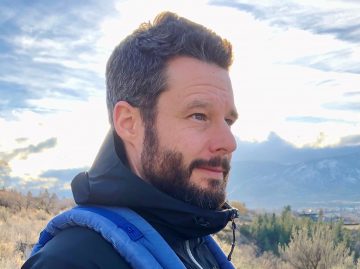Biography
Will Valley is an associate professor of teaching in the Faculty of Land and Food Systems at the University of British Columbia, and the academic director of the core curriculum in the faculty, the Land, Food, and Community (LFC) series. The objective of the LFC series is to create learning opportunities that encourage students to become citizens, professionals, and leaders who understand the opportunities and obstacles to creating regional, national, and global food systems that are ecologically regenerative, socially just, and economically viable. His research focuses on sustainable food systems education, food justice pedagogy, food literacy development, urban agriculture, and community-engaged scholarship. He is a member of the Gesturing Towards Decolonial Futures Collective of researchers, artists, educators, activists and Indigenous knowledge keepers from the Global North and South that focus on how artistic and educational practices can gesture towards the possibility of decolonial futures. Will is the chair of the Sustainable Agriculture Education Association, an international non-profit organization that promotes and supports the development, application, research, and exchange of effective teaching and learning practices in sustainable agriculture and food systems in post-secondary education and curricula through communication, training, development, and collaborative activities for teachers and learners. He is also co-director of Inner City Farms, an urban farming non-profit in Vancouver, BC. Prior to teaching at UBC, Will taught elementary and high school sciences, math, and PE in Vancouver and the South Okanagan-Similkameen region of BC.
Meeting Will
What is your most memorable experience from your time in the Faculty of Education?
Apart from developing close friendships with other students enrolled in the Bachelor of Education program, my most memorable experience was my first full day of teaching in a high school setting during my extended practicum. I remember sitting at my desk at the end of the day, knowing that I had a significant amount of prep to do that night to get ready for the next day’s lessons, but my head was spinning with all of the details, conversations, concerns, and issues that had accumulated since the first bell at 8:30am. I could barely make a coherent To-Do list! That’s when it dawned on me how complex the profession was, and how much more stamina I needed to develop if I wanted to be an effective teacher (and make it through the week).
Where has your education from the Faculty of Education taken you in your career?
Upon graduating with a Bed in the summer of 2004, my partner and I taught English in Istanbul for eight months, which was a fascinating opportunity to experience teaching in a new educational setting, in addition to all the wonders of the vibrant socio-cultural dimensions of the historic city. Upon our return to BC, I taught in school districts in the South Okanagan and Similkameen, as a Teacher-On-Call and through short-term contracts. I wasn’t sure I would enjoy being a TOC but it was one of the most dynamic parts of my professional development as an educator, helping me learn to be adaptable and comfortable in contexts of uncertainty. I eventually found teaching positions in Vancouver, in the public and independent school systems, as a TOC and in part-time positions. Although trained as a high school specialist, I was fortunate to teach in an elementary school setting, which completely reformed my teaching approach and appreciation for the fundamental competencies that early-year educators cultivate in our young learners – something I utterly took for granted as a secondary school teacher. I retuned to UBC in 2008 to enter graduate school in the Faculty of Land and Food Systems to further develop my capacity to bring agriculture and food-related topics into my classroom teaching. I was fortunate to be part of a 5-year, federally funded project, the Think&EatGreen@School project (2010-2015), which partnered academic researchers and instructors with stakeholders in the Vancouver School Board (e.g., teachers, staff, and administrators) and community organizations to work towards increasing the sustainability of school food systems in the VSB. In 2014, I completed my PhD and started working in the Faculty of Land and Food Systems as instructor and I am currently an associate professor of teaching.
Where do issues of inclusion find a place in your life or at work?
I have increasingly been seeking out opportunities to raise my own awareness and understating of issues of justice, equity, diversity and inclusion, and how I can contribute to dismantling historic and contemporary systems of oppression that permeate our society. I recognize how I (and my family as 4th generation settlers in so-called Canada) have personally benefited from white supremacy as well as my complicity in the reproduction of many forms of social oppression through my role as a teacher in the colonial institutions in which I have been employed. As one part of my responsibility as an individual with very high levels of unearned privilege, I incorporate social justice-oriented content and pedagogical practices into my teaching. I have recently published an open-access article on developing an equity competency model for sustainable food systems education programs with colleagues from across North America (Valley et al, 2020). We hope it contributes towards collective efforts to dismantle systems of oppression in the food system and beyond.
Do you have any words of wisdom for current students? Newly graduated folks?
It gets easier! As a new teacher, you hear this a lot, because it’s true. We are typically mentored by those who are excellent at their craft. And what we often don’t have access to is their development over time, which can make us feel like the job should be easier, or that we are not good enough. One of my mentors early on told me that no one is born a good teacher, it takes time, effort, reflection, and humility. So be patient, surround yourself with colleagues who will give you honest (and frequent) feedback, and it will get easier (but no less hectic!).
